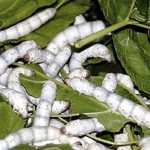 Researchers said they have developed a new method of creating large amounts of flu vaccine by using the genetic code of silkworms.
Researchers said they have developed a new method of creating large amounts of flu vaccine by using the genetic code of silkworms.
They said the new procedure is quicker and less costly than conventional methods.
The major component of flu vaccines is a special protein that exists on the surface of flu viruses.
Led by Kuniaki Nerome, director of a biological resources center in Nago, the team of researchers synthesized DNA that helps enable the protein based on the genetic information of a flu virus. The scientists then introduced the synthesized DNA into the genetic code of silkworms.
After the silkworms turned into chrysalides, Nerome and his colleagues crushed the insect pupae and purified the resulting powder. They then found the special proteins with exceptional high purity on the surface of the powder particles.
They also discovered that the structure of the particles was similar to that of flu viruses, which means vaccines made from the particles would likely provide a highly effective treatment. Further studies revealed that vaccines developed with the new method were about 100 times more effective than existing vaccines.
The researchers said the new method will enable scientists to develop vaccines against a new strain of influenza more quickly.
Conventional technologies require a large number of chicken eggs specially prepared to culture flu viruses. It usually takes more than six months to create a vaccine when a new type of flu appears. But the new method using silkworms will enable scientists to complete a new vaccine in three months, Nerome said.
Nerome added that he has already started working on a prototype vaccine against the H7N9 strain of bird flu, currently rampant in China, in addition to one to deal with the H5N1 bird flu virus.
Working with an Indonesian university and backed by the Okinawa prefectural government, the team is looking to reduce costs to one-tenth the current level in an effort to commercialize silkworm vaccines to prevent flu infection among chickens.
The researchers plan to later evaluate the safety and efficacy of the new technology for humans, and intend to market human vaccines made from silkworms within several years.
The team presented its findings at an international conference on infectious diseases that started in Okinawa on Feb. 14.
Source: The Asahi Shimbun

















